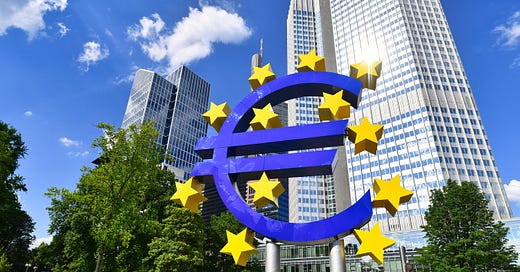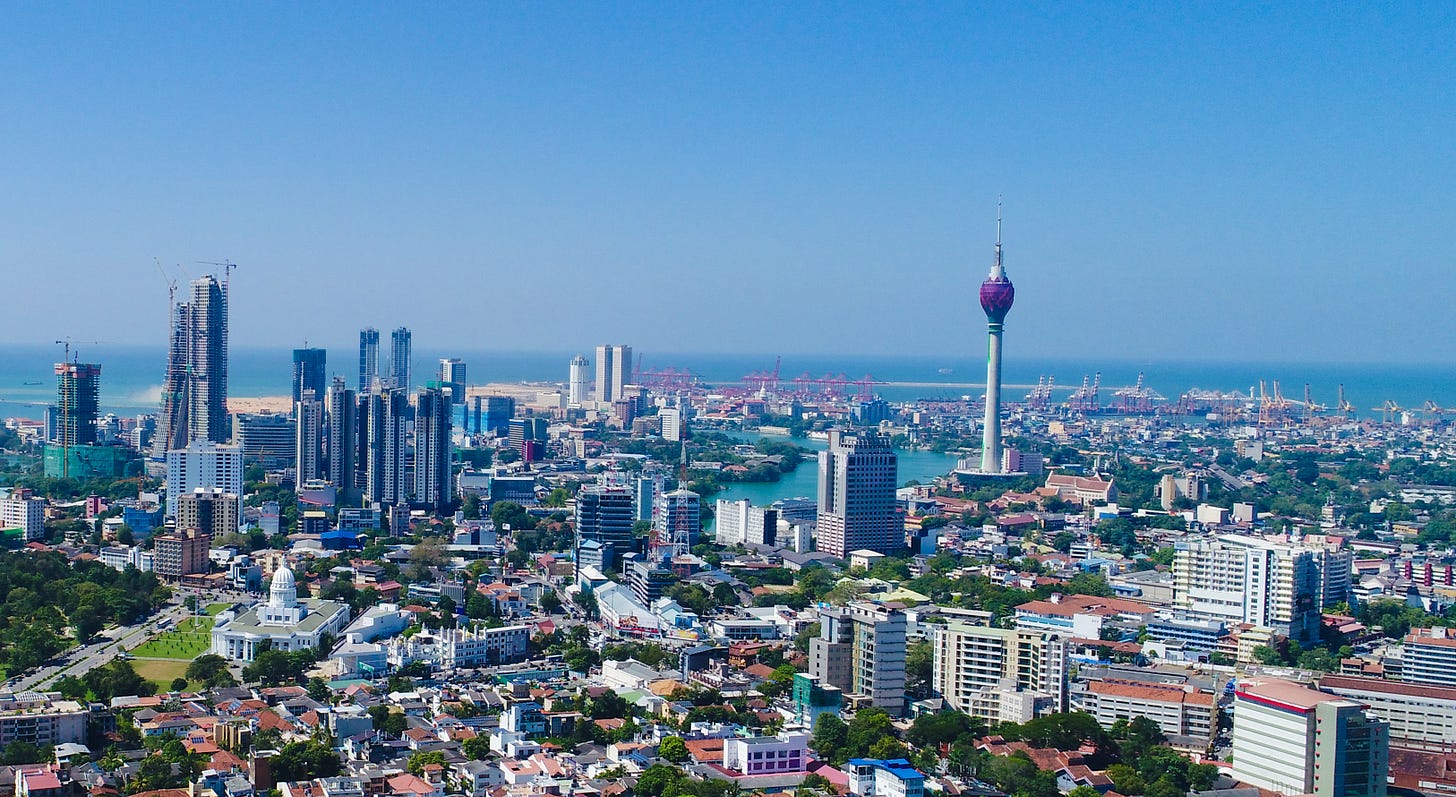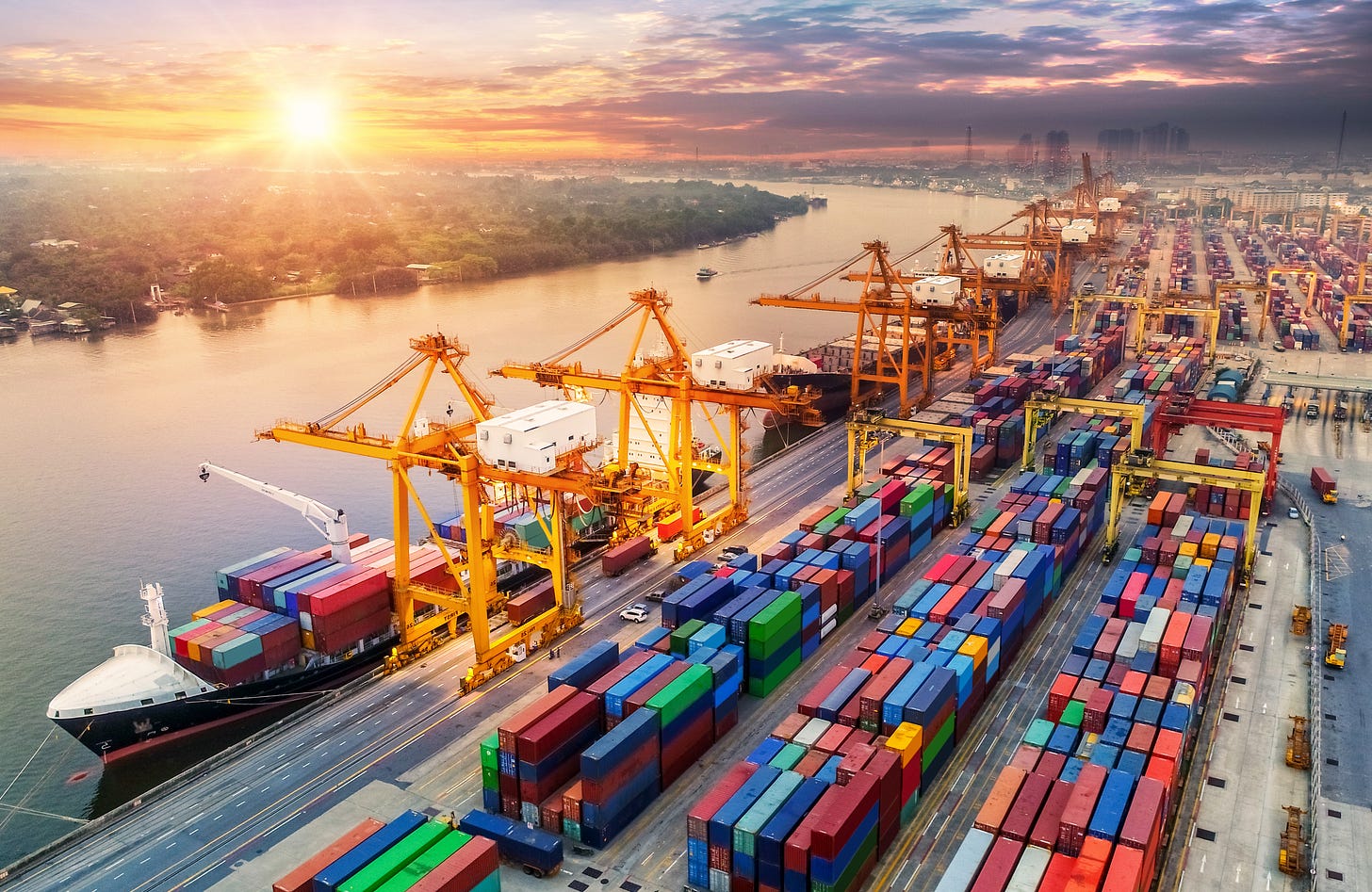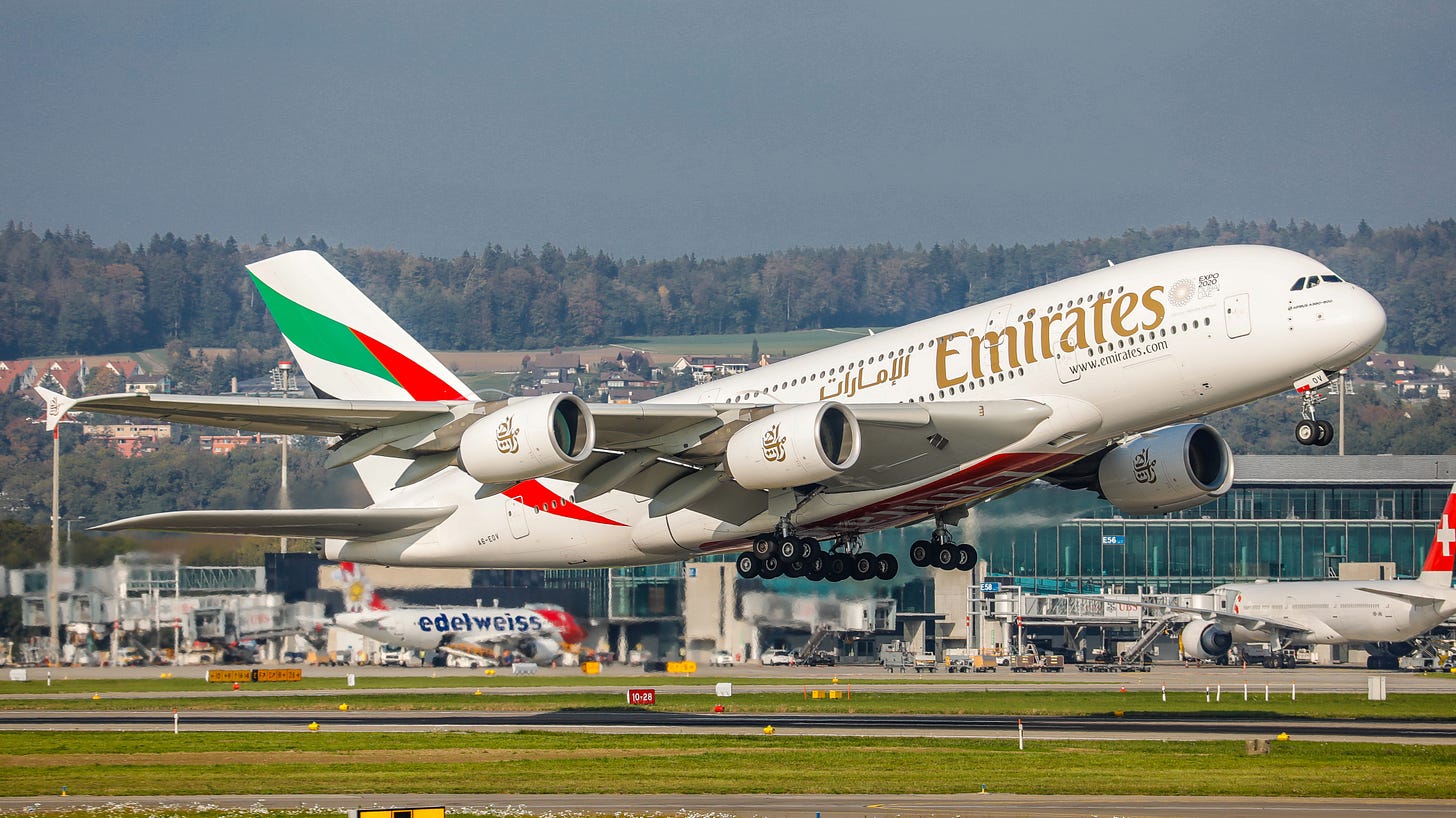Emerging Markets Monitor - July 14
Euro Hits Parity With Dollar, China Big Tech Cuts Back Investments, Fed Historic Rate Hike Coming?, Sri Lanka Debt and China, Container Boom Slows
The Top 5 Stories Shaping Emerging Markets from Global Media - July 14
Euro Falls to Equal the U.S Dollar For the First Time in 20 Years
The New York Times
“Take a look: €1 = $1.”
“With a war on the eurozone’s border, an uncertain energy supply from Russia and a growing risk of recession, the pressures bearing down on the euro finally grew so strong that on Wednesday it briefly dipped below parity with the U.S. dollar — a one-to-one exchange rate.”
“It was a sight unseen since December 2002, in the early years of the currency’s existence. The aesthetically pleasing round number has become a focal point for investors.”
“In foreign-exchange markets, ‘1.00 is probably the biggest psychological level around,’ analysts at the Dutch bank ING said in a note to clients.”
“Even more remarkable than breaching this level is how quickly the euro has dropped against the dollar. The currency, shared by 19 European countries, has slumped more than 11 percent this year, as the dollar’s strength has been almost unmatched.”
“The euro’s sharp decline has come as the dollar, for generations one of the safest places to park money, has strengthened against almost every major currency in the world.”
“Currencies move like stocks, bonds or any other asset — investors can buy them directly when they think they will grow in value, and sell when they think they will decline.”
“They also reflect global demand for a country’s assets in general, because buying U.S. government bonds or Apple stock requires getting dollars first, and lots of global trading takes place in dollars. So, as often happens in times of economic distress, people looking for a safe place to put their money have bought more dollars, at the expense of other currencies like the euro.” Eshe Nelson reports.
China Big Tech Cuts Back on Strategic Investments Amid Beijing Scrutiny
South China Morning Post
“China’s Big Tech companies, from internet giant Tencent Holdings to TikTok owner ByteDance, are paring down their strategic investment units, according to industry sources and publicly available data, in line with efforts to reduce new acquisitions because of Beijing’s continued scrutiny of the sector.”
“Tencent, which runs the world’s largest video gaming business by revenue and China’s biggest social media platform through super app WeChat, saw some teams from its downsized investment department lay off half of their members, while a number of affected employees were reassigned to other business units, according to three people with knowledge of the matter, who declined to be named because the information is not public.
“That personnel adjustment was reflected in the company’s latest investment and acquisition figures, which have headed south. China’s most valuable tech enterprise made just 32 investments and acquisitions in the first half of this year, which accounted for about a quarter of its 129 total transactions in the same period in 2021, according to data from ITjuzi, a market research firm that tracks deals in China’s internet industry.”
“Shenzhen-based Tencent, which was once thought of as ‘owning half of the mountains and rivers’ in China’s tech industry because of its aggressive investment strategy, declined to comment.”
“Investments have been more financially important for Tencent, according to Arete Research. It indicated that Tencent’s pre-tax profit from investment, for example, contributed to 63 per cent of its overall income in 2021, compared to 36 and 15 per cent in 2020 and 2019.” South China Morning Post reports.
Amid Soaring Inflation, Fed Could Hike Rates a Full One Percent
Bloomberg
“Federal Reserve officials may debate a historic one percentage-point rate hike later this month after another searing inflation report piled pressure on the central bank to act.”
“‘Everything is in play,’ Atlanta Fed President Raphael Bostic told reporters in St. Petersburg, Florida, on Wednesday after US consumer prices rose a faster-than-forecast 9.1% in the year through June. Asked if that included raising rates by a full percentage point, he replied, ‘it would mean everything.’”
“Investors bet that the Fed is more likely than not to raise interest rates by 100 basis points when it meets July 26-27, which would be the largest increase since the Fed started directly using overnight interest rates to conduct monetary policy in the early 1990s. Americans are furious over high prices, and critics blame the Fed for its initial slow response.”
“Cleveland Fed President Loretta Mester, speaking Wednesday evening in an interview on Bloomberg Television, declined to say if she favored going bigger at the July meeting, noting there were important data releases between now and then. But she said there was ‘no reason’ for raising rates by less than the 75 basis points that policy makers delivered last month.’” Bloomberg reports.
Sri Lanka Debt Crisis Tests China’s Role as Financier to Poor Countries
Wall Street Journal
“As Sri Lanka’s foreign-exchange reserves began to dwindle under a mountain of debt early in the Covid-19 pandemic, some officials argued it was time to ask for a bailout from the International Monetary Fund, a politically fraught move that traditionally comes with painful austerity measures.”
“But China, Sri Lanka’s largest single creditor, offered a tempting alternative: Skip the IMF’s bitter medicine for now and just keep adding on new debt to pay off the old, according to current and former Sri Lankan officials. Sri Lanka agreed, and soon $3 billion in new credits poured in from Chinese banks in 2020 and 2021.”
“Now that plan has blown up, plunging Sri Lanka into chaos. Amid crushing debt and sky-high inflation, the country has run out of U.S. dollars to pay for imports of basic goods, leaving citizens waiting for hours to buy fuel and major cities scrambling to keep the lights on.”
“By the time Sri Lanka finally decided in April to apply for IMF relief, its economy was nosediving toward one of the deepest recessions since the country’s independence in 1948, fueling a popular rebellion that saw the president chased from his home by hordes of demonstrators.”
“…With around $35 billion in foreign debt, Sri Lanka is the first government in the Asia-Pacific region to default on its international obligations since Pakistan in 1999. Its negotiations with the IMF will pose a test of Beijing’s willingness to help resolve a sovereign-debt crisis in the developing world that critics say China’s own lending policies helped create.”
“For more than 60 years, sovereign-debt restructurings have been coordinated by the Paris Club, an informal association of 22 major creditor countries, mostly Western and some in Asia, including the U.S., France, Germany, Japan and South Korea.”
“…China isn’t a member of the Paris Club, partly because it wasn’t a major creditor nation until the mid-2000s. Since then, it has gone on a lending binge to support its strategic Belt and Road Initiative. Today, World Bank data show that China by itself has more loans outstanding to low-income countries than all the members of the Paris Club combined.”
“…In addition to Sri Lanka, the African nations of Zambia and Ethiopia, both major Chinese borrowers, are now restructuring their debts. Other developing countries, including Kenya, Cambodia and Laos, also have a high share of their debts from China and looming maturities that economists aren’t sure they can pay.” WSJ reports.
Post-Covid Container Boom Coming to an End
Sea Trade Maritime News
“The Drewry Global Port Throughput Index stood at 141.1 points in April 2022 some 1.5% lower than April 2021, although up 1.7% on March 2022.”
“The year-on-year was seen as a sign that the demand surge seen from Q3/Q4 2020 as the world came out of the first round of Covid lockdowns is now on the wane. ‘This is further evidence that the post-Covid demand boom appears to have run its course,’ Drewry said.”
“The post-Covid lockdown demand boom and supply chain congestion have acted to drive container freight rates to record levels.
“The impact of the Chinese Covid lockdowns was felt across Asian ports outside China and throughput was down 4.1% in April 2022 compared to a year earlier. European port volumes also fell by 3% in April 2022 compared to the same month in 2021 due to the impact of higher energy prices caused by the Ukraine crisis impact production costs and consumer demand.” Sea Trade Maritime News reports.
Connectivity, Not Oil, Will Drive the Middle East’s Future
By Afshin Molavi
An excerpt from Emerging World founder Afshin Molavi’s latest syndicated column
On the very day that US President Joe Biden lands in Saudi Arabia this month, nearly 200,000 containers will be making their way to ports from Tangier to Dubai, hundreds of thousands of airline passengers will transit through the region’s airports, millions of dollars in remittances will be flowing from the region to the developing world, and countless American companies will be selling their wares to a growing Arab middle class.
Oil and gas, once the main draws for the West, will almost be an afterthought. In other words, it will be just another day of business in the Middle East and North Africa (MENA).
For too long, the United States’ regional policy has focused almost entirely on the triumvirate of security, geopolitics, and oil. It’s time for the US – and the broader Western world – to widen its scope and see the MENA region for what it is, and not a caricature of what it was in the 1970s.
The full article published here in Asia Times
To our French and Francophone readers: Bonne Fete Nationale!
We always end the Monitor with a quote, usually one of inspiration. Here we end with the incomparable Victor Hugo.
"Even the darkest night will end and the sun will rise." — Victor Hugo (Les Misérables)









